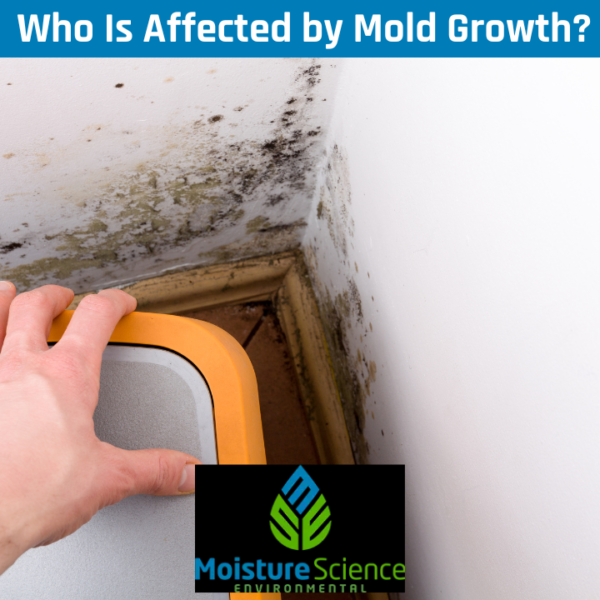Scientists and medical professionals struggle to put an exact figure on it, but most in the medical field believe up to 25% of Americans are negatively affected by mold growth. Moisture Science Environmental provides professional mold inspection services which will help you to know and understand the contamination level of the molds in your house or business space.
What Are Molds?
Molds are part of the group of organisms known as fungus. Generally, these organisms’ main function is to break down plant matter. As leaves, twigs, flowers, etc. fall to the ground, fungus feed on these materials and convert them to nutrients. Fungus also serves as a food source for both humans and animals alike. Lastly, fungus serves a very important role in the development of medicines. One of the most famous antibacterial medicines ever developed is penicillin, which is derived from the mold Penicillium. Ironically, if you are allergic to penicillin then you are definitely allergic to the mold Penicillium and often, mold in general.
Not all molds are dangerous, but a professional mold expert such as Moisture Science will be able to help you determine your area of concern.
Where and How Do Molds Grow?
The vast majority of molds grow outside. Anywhere you find plants and trees, you find mold. Unlike plants, which rely on the sun for energy and growth through photosynthesis, molds do not need the sun or sunlight. In fact, they can grow in the complete absence of light.
Where are the most densely populated areas for mold? Any forest, grassland or other location with plants, grasses or trees. When it comes to mold growth in homes, the issues are where moisture is not properly ventilated and accumulates. Moisture Science can inspect and remediate your home moisture issues in these top locations:
- Crawlspace Mold Removal
- Basement Mold Cleaning Services
- Mold in Attic Remediation
- Bathroom Mold and Mildew
The first step to identifying mold is to perform professional air testing. Moisture Science is the expert in mold testing because of our experience and education. We provide resources to help you understand how to test air quality in your home. If you live in Philadelphia or New Jersey, trust the best mold professional.
How Do Molds Affect People?
The majority of the population is not negatively affected by mold. Every time you walk out of your front door you are breathing mold spores. They are literally everywhere (exception would be environments like the South Pole or extreme desert conditions) and anywhere in the United States.
Mold spores are EXTREMELY tiny. We are talking about an organism that when in its spore form is 3 microns in size which means hundreds of thousands of spores can fit on the tip of a pencil. So every day when we walk outside, we breathe in millions of spores.
The Most At-Risk for Health Problems With Mold Exposure
There is no specific age group that is immune from the effects of mold growth, there are age groups that have a higher risk of adverse health effects. The first risk group is children under 6 years of age. When a baby is born the immune system is not fully developed. It takes time, vaccines, exposure to microbes, and possibly herd immunity. This process takes years to fully happen, and it’s during this period that children are especially vulnerable to mold-related infection.
Of particular concern is the development of asthma. There have been numerous published reports where it is believed that 50% of childhood asthma is caused by mold. It is therefore very important to make sure young children are not exposed to high levels of airborne mold spores.
The other high-risk age group is persons over 65. In the opposite process that children go through where the immune system is slowly building up, in the elderly the immune system is slowly becoming weaker. This process begins at around 65 years of age and progresses as the person ages. This is also why the elderly are more susceptible to infections such as flu and coronaviruses.
In general, anyone with an allergy to mold or respiratory issues such as asthma or COPD will be at-risk for health problems with mold exposure. Exposure to mold spores can wreak havoc on their respiratory and immune systems. Since mold spores readily float in the air, the mode of entry into the human body is through the lungs and mucus membranes. For those sensitive to these spores, either the proteins found within the various fungus OR the toxins that they produce will cause an allergic reaction.
What Are the Signs You Are Affected by Molds?
There are too many conditions to list all of them, but the most common diseases caused by mold are allergic sinusitis, mold-induced asthma, aspergillosis, hypersensitivity pneumonitis as well general allergy symptoms such as rash, wheezing, itching, sneezing, watery eyes, headache, and brain fog.
Learn more about the dangers of mold.
Why Does Mold Affect Some People?
Whether you are prone to adverse health problems from mold is almost entirely due to your genetic makeup. If both your parents or grandparents were allergic to mold, chances are pretty good that you will be as well. Of course, if your immune system is compromised for any reason such as illness or medication, that will also make you more prone to the health effects of mold.
How To Control Household Mold Growth?
Almost every location in the United States contains mold growth that interacts with everything and everyone. We can reduce the opportunity for mold to become a contamination issue but almost never fully eliminate it. If you are trying to manage mold growth in your home, there’s an easy solution: Control the moisture and you control the mold!
While that seems like such a simple concept, it is easier said than done. There are a lot of individual steps that a homeowner must take to mitigate moisture issues and subsequent mold problems. These steps include directing moisture away from the exterior foundation, maintaining the relative humidity in the basement and crawlspace at 55% or less and finally making sure that all paper products, textiles and clothing are stored in plastic bins if they are in the basement.
Schedule Waterproofing Services
Do You Need to Do a Professional Mold Inspection?
The signs and symptoms for the young and old are basically the same. Wheeze, itchy skin, watery eyes, unexplained headache, sinusitis and chronic allergy that does not follow seasonal patterns. In addition to those who are very young or elderly, persons with autoimmune disorders such as asthma, arthritis and allergy to penicillin are particularly vulnerable to elevated mold spores. If you fall into any of these categories and/or smell a musty odor anywhere in the home, you need a professional mold inspection to determine the scope of the problem and root causes.
Trust Moisture Science for Mold Removal
Moisture Science Environmental is a local mold professional, happy to assist residents and businesses in NJ and Philadelphia with moisture mitigation. MSE is owned and operated by one of the few mold removal experts in the USA with a degree in Microbiology. If you find mold in your home or business, then contact our mold expert to help you out.



